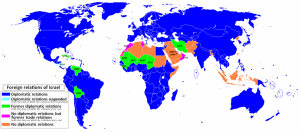We have all suspected India has drawn closer to Israel. Defence, trade and agricultural co-operation is booming. Let’s take a sweeping view before evaluating its implications.
- Israel is India’s fifth largest arms exporter. The imports were worth Rs 1,193 crores in 2013-14 and Rs 59,670 crores over the past decade;
- India’s total trade with Israel is Rs 36,160 crores in 2013-14, up 57% over 2009-10. India’s is Israel’s biggest trade partner in Asia;
- India vastly relies on Israel for its water management and agricultural technologies;
- More than 40,000 Indians visited Israel in 2013, the largest number of tourists from an Asian country.
Later this year, Narendra Modi will become the first Indian prime minister to ever to visit Israel. Last year, home minister Rajnath Singh visited Tel Aviv.
This is quite a roaring affair given the background between the two nations. Between 1948-92, India had recognized Israel but not established diplomatic relations. It was a caution-first policy given India’s vast number of Muslims. Then in January 1992, New Delhi abruptly modified its stance and exchanged diplomatic missions with Tel Aviv. In just over two decades, the alliance has shown a hockey-type growth.
Nicolas Blarel’s new book “The Evolution of India’s Israel Policy,” offers the view that Indian nationalist movement of the 19th and 20th century looked to draw all fragments of Indian society. The majoritarian ambitions of the Hindu right were not encouraged.
At several points from M.K. Gandhi to Indira Gandhi, there was a clear distaste to Israel’s alignment with colonial powers—from Britain to United States–against the Palestinians. India didn’t approve it since from the 1920s to the 1980s, India was firmly in the camp of anti-colonialism.
Besides, India had turned into some kind of a leader of Third World Project. When Israel joined UK and France to attack Egypt in 1956, Nehru condemned the action in Lok Sabha as an “Anglo-French attack helped Israeli aggression and was itself helped by it.” India had then looked to support Egypt due to their shared role in the Afro-Asian bloc and the Non-Aligned Movement (NAM).
NAM clearly didn’t want to align itself either with US or Soviet Union. It wanted to uphold United Nations and international law. Israel, on the other hand, flouted UN resolutions from 1948 onwards almost regularly.
Even Hindu right’s Atal Bihari Vajpayee demanded as foreign minister in 1977 that Israel “vacate all occupied Arab territories.” Complete disregard for the UN and its institutions by Israel wasn’t accepted by India. As late as 2014, Israel’s brutal attack on Gaza found a critical note from Ministry of External Affairs (MEA) in India.
The changed stance in 1991-92 had a lot to do with India’s sinking economy. It wanted to grow close to United States after launching its liberalisation policy. If Washington was to be wooed, Israel couldn’t have been ignored. India clearly wanted to grow closer to industrialized nations.
The pact between the two has grown stronger and stronger. While the Congress party wanted to be quiet about it, the present government sees no reason to hold itself back. But both the parties had drifted away from the non-alignment cause of the early 90s, that’s for sure.


